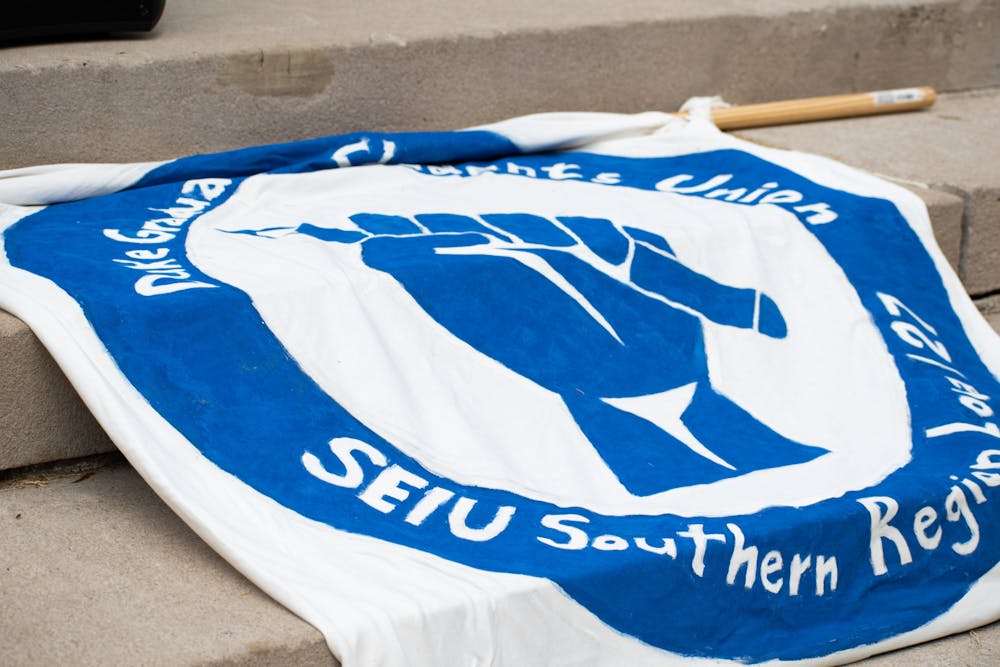Since officially being recognized by the National Labor Relations Board in August 2023, the Duke Graduate Students Union has engaged in multiple bargaining sessions with University administration to negotiate their demands, yet members continue to express an overall dissatisfaction with Duke’s response.
With NLRB recognition, Duke is required by law to accept DGSU as the exclusive bargaining body for the University’s doctoral students. Students on the DGSU bargaining committee act as union representatives in meetings, “negotiating on the conditions of [their] work,” which range from housing to workplace safety and payroll.
DGSU was the first recognized graduate student union at a private university in the South, and is the largest union at Duke and one of the largest in North Carolina.
Since 2018, Duke has consistently been named the largest employer in Durham County and the second-largest private employer in N.C. It was named by Newsweek as among America’s Greatest Workplaces for 2024 and Forbes as one of America’s Best Employers for New Grads in 2024.
However, DGSU maintains that University administration “is stuck offering [them] the status quo” and continues to call on Duke to continue to bargain with them in “good faith.”
University administration did not respond to The Chronicle’s request for comment explaining its position in the ongoing negotiations and responses to the union’s demands.
The union’s top priority is a cost-of-living-adjusted stipend. The University responded to many of DGSU’s economic proposals at a July 11 bargaining session, addressing the rest on July 31 and Aug. 14.
In March, DGSU proposed a minimum stipend of $54,484.10 — accounting for a “living wage plus 10% for savings” — for the 2024-25 academic year to increase annually by a minimum of 3.5% until the 2027-28 school year. The University countered with a $40,000 stipend with a 3% yearly increase. The current academic year minimum stipend for first-year matriculants is $30,000, while that for those in their second year and on is $40,000.
According to an Aug. 24 email to The Chronicle from Clay Capra, a graduate student in the history department, DGSU was “disappointed” by Duke’s response to its stipend demand, especially given that the University reportedly pre-committed to a $40,000 stipend floor before bargaining began.
“[$40,000] is around [$10,000] below the living wage for Durham according to the MIT calculator,” Capra wrote in an Aug. 24 email to The Chronicle. “Graduate workers know that we need a fair wage to live and work here in Durham, and it’s an issue our membership is consistently activated on and excited to organize around.”
Capra emphasized the importance of raising the stipend’s amount amid inflation and a rising cost of living.
“Inflation and cost of living are growing constantly, and our wages simply aren’t keeping up. Perhaps more than anything else, stipend affects every single graduate worker here at Duke,” he wrote. “It’s a reminder of how high the stakes are for our union: we’re bargaining to be able to afford to live and work in Durham.”
Capra said that DSGU representatives do not take for granted the opportunity to speak with University administration to tell them “face-to-face how much we struggle to make ends meet getting paid less than a living wage.”
In its health insurance proposal, DGSU demanded that Duke cover 100% of health insurance premiums for individual coverage and 75% of the total premium cost for dependent coverage under the Duke Student Medical Insurance Plan. The University did not respond with changes to the current health insurance policies.
For graduate students with dependents, DGSU outlined a childcare subsidy of up to $10,000 for a single child. It further demands “clarity and transparency about the use of this fund” and proposes income thresholds for differing benefit levels. The University did agree to expand funds to a maximum of $7,000 per person with “no change of policy on transparency.”
Students requested that bargaining unit members have the same access to parking-related services as full-time University staff. The union’s proposed contract also included a pre-tax program to aid in parking fees and a cap on the annual parking pass to 0.3% of the yearly salaries of bargaining unit members. Duke did not agree to integrate the new proposals.
To assist graduate students with medical expenses, the University currently has a Medical Assistance and Financial Hardship Support Fund, which aids those who “incur medical expenses that are not eligible for reimbursement and create a significant hardship.”
Union members called for an expansion of the support fund, asking the University to designate $100,000 to this fund each fiscal year with each member being allowed to request up to $12,000 per fiscal year. They also requested that the limit fluctuate based on “utilization of the fund.”
Duke countered with $5,000 per student each fiscal year and denied limit flexibility based on yearly spending.
Aside from the monetary demands, a significant portion of DGSU’s proposals center on international graduate students.
Get The Chronicle straight to your inbox
Sign up for our weekly newsletter. Cancel at any time.
DGSU requested greater financial and logistical support for graduate workers who are in the process of obtaining their visas. The union advocated for greater compensation for visa-related fees, full coverage of legal fees related to work authorization and a $60,000 fund for miscellaneous international student legal fees. This would include any out-of-pocket legal expenses except for immigration issues that directly affect a member’s ability to work at Duke.
Duke tentatively agreed to discuss a potential immigration costs fund internally, still reserving the right to make a counterproposal in a future bargaining session. However, it rejected all compensation demands for legal fees and work documents.
Most international graduate students who are not native English speakers are required to take oral and written placement exams upon matriculation. However, frustrated by a perceived lack of transparency in the English language proficiency process, members demanded that bargaining unit members who do not pass these courses be given an “adequate explanation of their results,” and those “who wish to appeal their results shall be provided with clear, relevant avenues to do so.”
Duke accepted the latter demand and has agreed to uphold transparency and clarity, have seats available in all English language proficiency classes and to offer multiple class time slots per semester.
Capra noted that DGSU was “disappointed, but not surprised to hear that many of [Duke’s] proposals were status quo or minor adjustments to their current policy.”
“It really galvanized us to keep fighting for the working conditions we know that we deserve, and that graduate unions have already won for their workers at other universities,” Capra wrote. “We're going to keep organizing around these issues as we go into the year, and I'm personally very excited to keep fighting with my fellow union members to have our issues recognized.”
As far as the union’s priorities for future bargaining sessions, economic proposals and grievance procedures are at the forefront. Capra emphasized the importance of legal protection for unions, especially since most private sector workers are covered solely by the NLRA.
“We want to make sure that the protections that we win at the table are as robust as possible,” Capra wrote. “Especially because 40% of graduate workers at Duke are international students, whose visa status could be put under threat if they try to leave a hostile work environment, having a clear and fair grievance process seems particularly necessary to protect them.”
During the academic year, DGSU’s strategy will stay the same — expanding membership and spreading the word — except that pressure will be stronger due to students being on campus. The organization will be hosting a Sept. 3 rally, the day after Labor Day, during which they will continue to pressure University administration to “keep bargaining with [DGSU] in good faith and listen to graduate worker concerns and the issues that matter most to [the union].”
According to Capra, DGSU saw an uptick in membership after Duke’s first counterproposals, and hopes to keep up the momentum into the upcoming year.
“Members are really fired up about bargaining,” Capra wrote. “It’s a great show of our power as a union that Duke met us at the table quickly after our landslide election victory, and it’s such a clear demonstration of union power to be able to negotiate on the conditions of our work.”
For more information on negotiation updates, visit DGSU’s bargaining tracker and its official website.

Andrew Bae is a Trinity junior and an editor-at-large of The Chronicle's 120th volume.

